

 |
 |
Handling the Senior Pairs
Admittedly, the Old Fogies Event features a weaker field than that of an Open
Pairs. Merely playing well rarely is sufficient for a win, however; other
factors are involved. Not only must you and your partner be the
beneficiaries of your share of the luck, but you must be prepared to take full
advantage of the gifts presented you. Additionally, it can be important to
judge the skill-level of your opponents.
I offer you three opportunities to shine in the first session of the Friday Senior Pairs, as a little quiz. Solutions are at the end.
Board #33, your very first hand of the day:
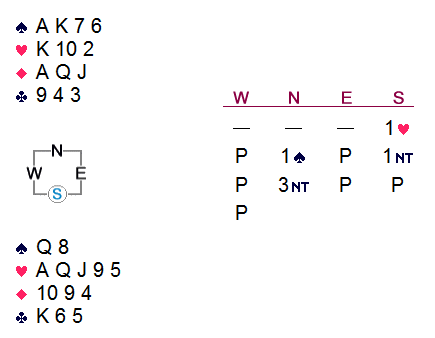
Opening lead:  Q
Q
East takes the ace of clubs and returns the ten. Naturally, you pause to assess the situation. Most declarers rate to play in hearts. As they would be able to draw trumps and discard the remaining club loser on one dummy's spade honors, they surely would take either eleven or twelve tricks, depending upon the location of the king of diamonds. Although you may be planning to admonish partner later for his choice of contracts, you cannot be concerned about such matters now. Clearly, you will need to take as many tricks as the others in order to earn any matchpoints on this board.
So concluding, you cannot afford to duck the second trick. In any case, the difference between scoring +400 and +430 is likely to be nil. Winning with the club king, you cash four rounds of hearts, discarding a club from dummy. East follows suit twice, then discards the diamond seven and the diamond three. On the fourth heart, west plays the diamond deuce. How do you continue?

Board #14:
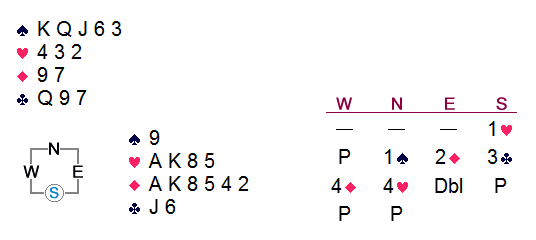
Opening lead: ♦Q
Partner's 4♦ bid was a weak distributional raise. He wins the first trick and continues with the diamond jack, south ruffing. At trick three, declarer leads the queen of hearts, partner following with the seven. As east in this diagram, plan your defense.

Finally, you are holding the west cards on Board #20, your last opportunity of the session:
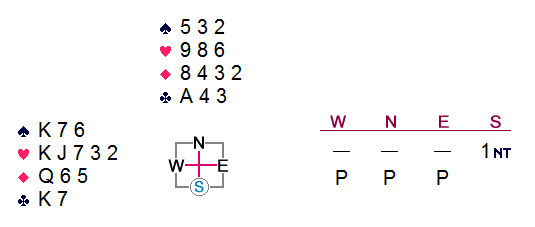
Opening lead: ♥3
Your partner furnishes the heart queen, ducked by declarer. The four of hearts is returned, won by declarer's ace. South cashes the ace of diamonds as partner follows with the nine. Declarer plays the club deuce to the ace, partner playing the jack. Now a diamond lead goes to the ten, jack, and your queen.
South's opening notrump bid showed 15-17 hcp. What is your plan?

Board #33:
This one requires an ability to 'go with the flow' — in this case, to capitalize upon a helpful hint from a defender. As luck would have it, your opponents are one of the city's more predictable pairs, with a tendency toward straightforward carding. You elect, therefore, to believe your right-hand opponent's signal in diamonds and abandon your plan to finesse in that suit. If the diamond king is offside, though, how might you hope to take the requisite eleven tricks?
In fact, it can be done, provided that RHO has the long spades and only three
clubs, a distribution that is consistent with the defenders' previous plays.
Your anticipated end-position looks like this:
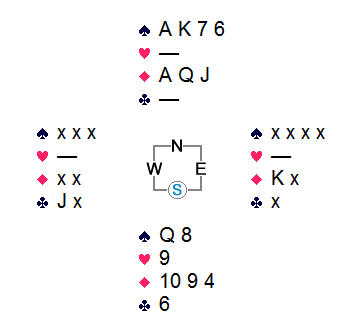
You cash your last heart in hand, discarding the jack of diamonds from
dummy! To avoid unguarding spades or diamonds, east parts with her
remaining club. Now you play off four rounds of spades, throwing her
into the lead for an endplay in diamonds. Taking eleven tricks is worth
35 of 38 matchpoints. The full deal:
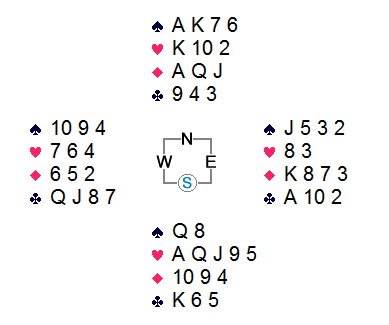
The play of this hand exemplifies the power of running a long suit. Today, as is so often the case, one opponent is squeezed in three suits, to her disadvantage. Although east's deuce of clubs had no material worth, it nevertheless held great value as the sole link to partner's club winners.
On this occasion, east's only realistic chance to garner any matchpoints was to hold on to her club and bare the diamond king, hoping that declarer would go wrong in the endgame. A simple count of the points (a defender's first priority) would have shown that west could have no hope of an entry, meaning that an attitude play in diamonds was a waste of time. Such a signal (if honest!) could only help declarer. But of course, you would have seen through that subterfuge and cashed the ace and queen of diamonds for your eleven tricks.
Note: Had you not gotten all of your tricks on this hand, you would not have won this event.

Board #14
You need to duck the first trump lead! Better yet,
you should play the eight-spot, and you must make your play in tempo,
lest you alert declarer to the danger.
After that play, put yourself in declarer's shoes. She could go down
one gracefully simply by playing on the black suits, losing just a diamond and
three trump tricks. But if the hearts actually are splitting 3-2,
then she would be in a position to make her doubled contract by drawing a second
round of trumps.
That is what our declarer attempts to do, and the roof falls in. You cash your ace and king of hearts, then lead a high diamond, forcing out declarer's last trump. You humor yourself by throwing all your black cards on three spade leads, then claim the last four tricks with the five of trumps and three more diamonds. That is down four. What fun!
Note: Had you not scored at least +300 on this hand, you would
not have won the event.

Board #20
Did you woodenly cash your three heart winners, hoping that partner would tell you what to do next? If so, that tactic probably cost you one or more tricks. The full deal:
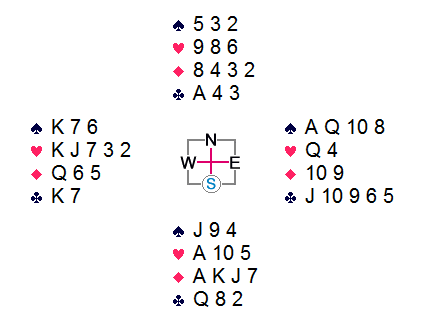
On the run of the hearts, partner is under pressure. He has seen
declarer's heart holding, and he can infer the diamond position from the play in
that suit. However, he knows nothing specific about the black suits, which
would leave him guessing what to keep. Should declarer hold KQxx
in clubs, for example, then he would have to guard that suit and discard at
least two spades.
It is hoped that your priorities are in order, meaning that you have cleverly
counted declarer's points. Partner's play in clubs denotes a jack-high
sequence. Declarer, therefore, holds the club queen, and you already have
'seen' 14 hcp in the south hand. So partner should have the ace of spades;
but even if declarer has fudged on his opening count (after all, this is
the Senior Pairs), he surely would not have the spade queen as well as the ace,
for that would give him a 20-count.
Concluding that whether declarer has fibbed or not is immaterial, you lay
down the king of spades immediately! When that card holds the trick, you
follow up with the king of clubs immediately! This tells partner everything
he needs to know — that is, to save spades and forget the clubs.
Your foresight actually enables you to win all the remaining tricks, as you
merrily run off three more hearts and three more spades. Your score of
+400 earns a top on the board.
Note: Had you not taken ten defensive tricks on this hand, you would not have won the event.

Well, how did you fare?